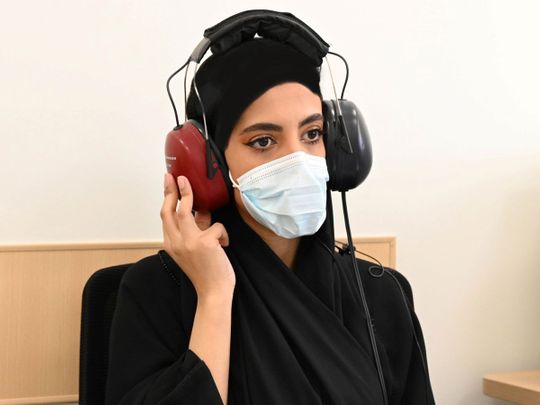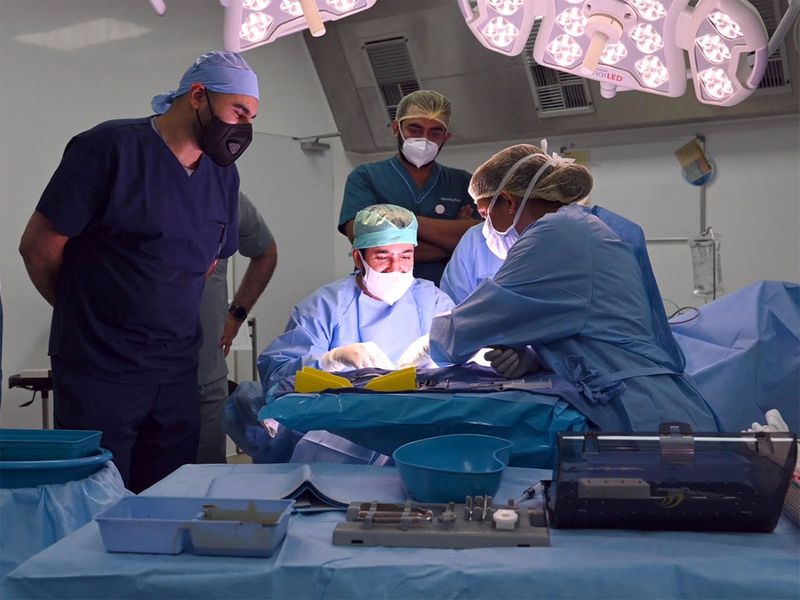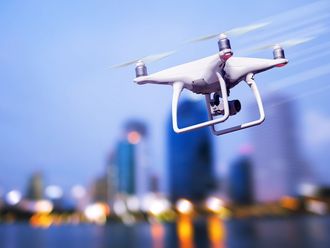
Abu Dhabi: For Mozna Al Zaabi, the world was largely inaudible.
Born with a hearing impairment, the 26-year-old Emirati had always found it hard to hear the sounds around her. The severe deafness in her left ear meant that she could only understand up to half of the stuff people ever said to her. And when she became a mother, Al Zaabi needed her children to sleep right next to her at night, lest she was unable to hear their cries.
Deafness in left ear
“When I was a young child, people would tell me that I spoke too loudly. I would explain that I could not hear myself through my left ear, so I was simply modulating my voice. Then, in third grade, I had to admit to my family and friends that I could not hear at all through my left ear,” Al Zaabi told Gulf News.
She put off seeing a specialist about it until her teens, in the hope that it was not a serious condition. But she finally visited an ENT specialist, Al Zaabi was told that there was no treatment for her hearing difficulties.

Depressing diagnosis
“The specialist said that the nerves in my left ear were not functional, and that it could not be treated. I became depressed. To me, the world became a closed space if my right ear was not turned towards it,” Al Zaabi said.
No one else in her family had a hearing impairment, so Al Zaabi did not have an example to learn from. A tryst with a pair of hearing aids a year or so later also proved futile, as Al Zaabi said they did not help her hearing at all, and simply proved to be too much of a hassle.
Struggles of a new mother
“When I got married, my husband also mentioned that I often spoke loudly. And I suppose I was most worried when my children, a pair of four-year-old twins and a three-year-old boy, were born, because I felt afraid that I would not be able to hear them if they needed me at night,” Al Zaabi said.
Nearly resigned to living with her condition, the homemaker and mother-of-three was referred last year to Tawam Hospital – part of the network of public health provider, the Abu Dhabi Health Services Company (Seha). A procedure at the Al Ain-based facility that implanted a new type of cochlear device suddenly and unexpectedly transformed Al Zaabi’s life.
“I had the procedure just six months ago, and I am now able to understand even conversations in loud surroundings, something I have never been able to do before,” Al Zaabi said.
Novel device
Dr Ahmed Al Shamsi, resident otologist and skull-base surgeon at Tawam, explained that Al Zaabi has single-sided deafness, a type of severe unilateral hearing loss that is not mitigated with the use of traditional hearing aids.
The surgeon therefore implanted a new type of implant, the Cochlear Osia 2, which uses digital piezoelectric stimulation to bypass damaged areas of the natural hearing system and send sound vibrations directly to inner ear, or cochlea. Piezoelectricity, the ability of certain materials to generate an AC (alternating current) voltage when subjected to mechanical stress or vibration, has been used for years in microphones, high-end speakers and medical equipment, but this is the first time it has been used in hearing implants here, the doctor said.
Reportedly the first implant of the device in Tawam and the second in the Middle East, the procedure took 40 minutes.
“SEHA is the first healthcare provider to bring this new advanced technology to the UAE for the benefit of patients with severe hearing conditions,” Dr Al Shamsi said.
Do not ignore
Discussing her joy at finding a solution on World Hearing Day – marked internationally on March 3, Al Zaabi called upon parents and guardians not to ignore signs of hearing loss.
“If you hear your child speaking loudly, please visit a doctor. Do not simply brush it aside,” she urged.
Preventable hearing loss
According to the World Health Organisation, more than 360 million people worldwide live with disabling hearing loss.
But more worryingly, over one billion people aged 12-35 years are at risk of hearing loss due to recreational noise exposure. In fact, one in two young people are at risk of hearing loss due to prolonged and excessive exposure to loud sounds.
In a statement, Seha warned that frequent exposure to high decibels can cause irreversible damage to the sensory cells in a person’s ears, resulting in noise-induced hearing loss or ringing in the ear. Given the permanent nature of the damage, only hearing devices and rehabilitation services can then be of help. In addition, the risk for permanent hearing loss is higher for people working in noisy areas, those who regularly listen to music through overhead or earphones, and who frequently visit places with amplified music such as clubs and concerts.
Largely preventable
“Noise-induced hearing loss is permanent but largely preventable. It’s simply a matter of adopting safe-listening practices. It is important that people pay heed to warning signs and get regularly screened. There are several self-check apps, such as hearWHO which are convenient. If you notice some signs or fail the self-check, its best to book an appointment with your family physician or an ENT specialist. In addition, we believe that every newborn should undergo examination and screening for hearing, which allows for early intervention and improves overall outcomes,” said Dr. Zafeer Ahmed, ENT specialist and acting chair of ENT department at Seha’s Ambulatory Healthcare Services.
Common symptoms of hearing impairment
Muffling of speech and other sounds
Difficulty understanding words
Trouble hearing consonant sounds
Frequently having to ask others to speak more slowly, clearly, or loudly
Needing to turn up the volume of the television or radio
Having to withdraw from conversations
Avoidance of some social settings
Safe listening practices
Set the volume to a maximum volume of 60 per cent when using headphones.
Use well-fitted noise-cancelling headphones so that you do not have to increase the volume without need.
Use ear plugs in noisy areas.
Avoid sitting too close to the source of sound.
Seek out quiet areas from time to time.
Only purchase devices with built-in safe listening features.












